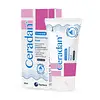What's inside
What's inside
 Benefits
Benefits

 Concerns
Concerns

 Ingredients Side-by-side
Ingredients Side-by-side

Water
Skin ConditioningCaprylic/Capric Triglyceride
MaskingGlycerin
HumectantSodium Trideceth Sulfate
CleansingButyrospermum Parkii Butter
Skin ConditioningSodium Chloride
MaskingSodium Lauroamphoacetate
CleansingCocamide Mea
EmulsifyingHydroxypropyl Guar
Emulsion StabilisingCitric Acid
BufferingPhenoxyethanol
PreservativeAllantoin
Skin ConditioningHydroxypropyl Bispalmitamide Mea
EmollientCholesterol
EmollientLinoleic Acid
CleansingIngredients Explained
These ingredients are found in both products.
Ingredients higher up in an ingredient list are typically present in a larger amount.
Cholesterol is a class of organic molecules called lipids. It helps hydrate your skin and is essential to having a healthy skin barrier.
Our skin naturally contains cholesterol in the outermost layer. Besides cholesterol, it also contains ceramides and fatty acids. Cholesterol makes up about 1/4 of your skin's outer layer and barrier. Your skin barrier is responsible for keeping allergens and microbes out. Having a healthy skin barrier is also responsible for keeping your skin firm and plump.
Our bodies use cholestrol to create vitamin D, steroid hormones, and more.
Learn more about CholesterolHydroxypropyl Bispalmitamide MEA is a synthetic molecule designed to mimic ceramides. Ceramides moisturize and strengthen the skin barrier.
This ingredient is claimed to be as effective as Ceramide 3, but with the added benefits of a lower melting point. This makes it easier to work with in formulations at a more affordable price.
According to a study looking at the structure of Hydroxypropyl Bispalmitamide MEA, this ingredient cannot be categorized as a ceramide because it is lacking the sphingosine moiety.
Learn more about Hydroxypropyl Bispalmitamide MeaLinoleic Acid is also known as Vitamin F. It is a fatty acid with emollient and skin conditioning properties. Our top layer of skin, or epidermis, contains high amounts of linoleic acid naturally.
Your body uses linoleic acid to build ceramides and prostaglandins. Ceramides keep your skin's barrier hydrated and strong while prosaglandins help control inflammation and healing. Needless to say, linoleic acid is crucial for having a strong skin barrier.
One study found applying linoleic acid rich sunflower oil to be more effective at repairing the skin barrier than oleic rich olive oil.
Linoleic acid is an essential fatty acid, meaning our bodies cannot create it on its own. We need to get linoleic acid through foods such as nuts and vegetable oils.
Acne-prone skin tends to have linoleic acid and high levels of oleic acid.
Linoleic acid can also help treat acne by softening sebum to prevent clogged pores. Another study found using 2.5% linoleic acid gel for 4 weeks showed a 25% reduction in small comedones.
This ingredient can also help lighten hyperpigmentation or sun spots by disrupting the melanin production process. It also helps your skin shed melanin pigment from your skin caused by UV exposure.
Due to its role in the production of the fatty acid prostaglandin, linoleic acid can also help reduce inflammation and support wound healing.
Linoleic acid is not always fungal-acne safe; it may trigger flare-ups in sensitive individuals.
Learn more about Linoleic AcidWater. It's the most common cosmetic ingredient of all. You'll usually see it at the top of ingredient lists, meaning that it makes up the largest part of the product.
So why is it so popular? Water most often acts as a solvent - this means that it helps dissolve other ingredients into the formulation.
You'll also recognize water as that liquid we all need to stay alive. If you see this, drink a glass of water. Stay hydrated!
Learn more about Water